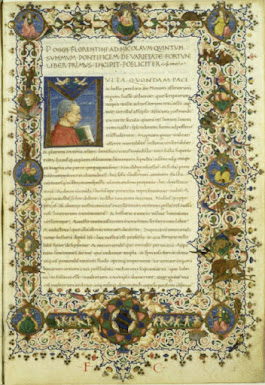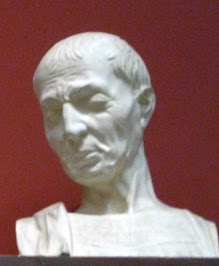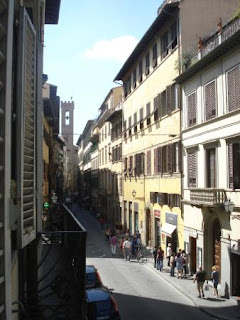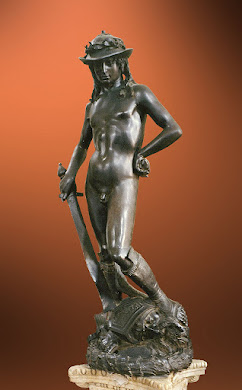Ross King is a British historian and writer who has arranged his life so as to spend as much time as possible in Florence. He has written five books about the city's history and art, and the two I have read are very fine. The Bookseller of Florence (2021) is not as delightful as Brunelleschi's Dome; it is too long and has too much detail about things like theological debates and the incomprehensible politics of Renaissance Italy. But it is deep and rich, and it set me thinking.
Reading this book is not like reading any book I know about the Middle Ages. It is more detailed about people's lives, words, conversations, arguments, and scandals. It creates in a marvelous way a sense of a place and a circle of people. It carried me away to Bookseller's Street to watch and listen to the scholars of Florence chattering and debating. I love the Middle Ages, but I do not know a book that makes any group of medieval people live in the way that this book does. Why?
Is it just that the records for 15th-century Florence are better and more detailed than those for any earlier time? Or was there something about the era that made this story more understandable and approachable for a modern reader than any book about chivalry or crusading could be? Or is it maybe that modern historians just write differently about "the Renaissance" than they do about "the Middle Ages"?
The 1400s were not really all that different from the 1200s. The European economy was still mainly about growing grain, making wine, salting fish, and raising sheep for wool. The population was smaller than it had been at its pre-plague peak, although Italy and Florence in particular seem to have recovered much more quickly than England or Scandinavia. Slow technological change in fields like shipbuilding, ceramics, metallurgy and chemistry had not yet transformed much of anything. The most forward-looking development of the period covered by King's book was probably the founding of a sugar colony on the island of Madeira, which happened in the 1420s, and which drew hardly any attention outside of Portugal. King's book focuses on intellectual life, and there was little new in fifteenth-century philosophy. Florentines were passionate about recovering manuscripts from the classical world, and they made heroes of men like Poggio Braccioloni who made major discoveries; but this had been going on for 300 years and we also know the names of men who went to Muslim Spain to copy Greek manuscripts in Toledo. Florentine philosophy was all about recovering, understanding, and intepreting Aristotle and Plato, and there was nothing original about that.
Poggio Braccioloni, cast of a statue by Donatello
Yet the atmosphere King sketches feels utterly new. The Bookseller of Florence focuses on Vespasiano da Bisticci (1422-1498), who rose from a humble bookstore clerk to become Europe's top dealer of high end, hand-copied books. Even as a barely illiterate clerk he attracted the attention of Florence's most learned men; he seems to have been the sort of enthusiastic student no teacher could resist. In his life he was part of two separate and quite distinct intellectual circles. In his youth he hung around the fringes of a a group the included the manuscript hunter Poggio, the architect Brunelleschi, the sculptor Donatello, the collector and classicist Niccolo Niccoli, the Greek scholar Francesco Filelfo, and Leonardo Bruni, a Latin scholar who became Chancellor of Florence.
These men liked to discuss philosophy while strolling back and forth along the Street of Booksellers, and when it rained they somtimes brought their arguments into the shop where Vespasiano worked. (Now a pizzeria, King tells us.) At other times they strolled under the Pisan Loggia. They all believed in the superiority of ancient learning and the desperate need to find, preserve and copy ancient manuscripts before they disappeared.
An interesting part of King's story concerns a bit of church history. In 1438, with the fall of Constantinople to the Turks looming, a council was held to see if the 400-year-old rift between the eastern and western churches could be healed, allowing Christendom to pool its resources against the Infidel. Dozens of eastern bishops and scholars arrived in Italy, and months of theological wrangling followed. The Italians were chagrined to discover that the manuscripts they had of early Greek theologians were in many cases corrupt, having been altered to support Catholic teaching. This, says King, reinforced for the Italians the need to find, not just one manuscript of an ancient author, but more, better, and older manuscripts, so that the original texts could be reconstructed. For the next century Italians scoured the libraries of old Orthodox monasteries, now mostly under the rule of the Turks, bringing home many ancient treasures.
Later on Vespasiano joined a different circle associated with Lorenzo de Medici and the philosopher Marsilio Ficino. New manuscripts continued to appear, including the complete dialogues of Plato (at least, all the ones we have) and the strange Hermetica supposedly written by the mythical Hermes Trismegistus. There was much intellectual excitement in Florence, although none of it much impresses modern thinkers. You can judge the depth of Ficino's thinking from his book on Plato, which argued that every word of Plato's books corresponds so perfectly with Catholic doctrine that he must have been divinely inspired. But although I don't find their ideas very interesting, it is fascinating to read detailed accounts of their get-togethers at Ficino's country villa, where they sat on the veranda and argued over the immortality of the soul and whether Christianity and ancient philosophy could really be reconciled.
In his maturity Vespasiano was often called the Prince of Booksellers. For clients that included kings and popes he produced beautiful, accurate manuscripts, mainly of the Roman classics but sometimes religious works or modern writers like Dante. He started as a bookbinder but he very quickly gave up doing any such labor himself and focused on organizing the process. Through his scholarly connections he obtained the best available manuscripts to work from. He then hired a scribe to do the writing – often one of the underemployed priests who were such a feature of Catholic Europe – supplying him or her with parchment and ink. If the author or translator was not available to check the text he often hired a poor scholar to do so. He then passed the pages to illustrators and illuminators, and then to binders. If all went well he kept about 20 percent of the selling price. This earned him a living but did not make him rich, and it says something about the society of Florence that the former bookbinder Vespasiano participated in dicussions with Lorenzo de Medici and his inner circle of intellectual friends.
King devotes a lot of attention to the rise of printing, which appeared in Florence in the 1450s. At first this had little impact on Vespasiano's business. By that time he was mainly selling to the very wealthy, who considered printed books vulgar. (Sales of luxury manuscripts remained strong into the 1500s, and King mentions one noble collector who owned some printed books but kept them locked in a closet where no visitors to his library would see them.) But slowly things changed, and by the 1470s printed books were taking over more and more of the market. Vespasiano retired in 1480, bemoaning that great scholars of Florence were all dead and the beautiful art of making books by hand was being destroyed.
Vespasiano's career, as laid out by King, raises this question: were 15th-century Florentines different from the people of a century or two before? Much of what we know about the circles Vespasiano moved in comes from a book he wrote, The Lives of 103 Illustrious Men. These were all men Vespasiano knew, only a handful of them considered "illustrious" by modern historians. A few would be otherwise almost completely unknown, just names in the civic records. This brings me back to the question of why we know so much about the artists and thinkers of "the Renaissance." Partly this is because Florence was never sacked or bombed and its civic records survive remarkably intact. But even more it is because the people of 15th-century Florence considered themselves supremely important and worked hard to preserve the memory of themselves and their friends. They could not stop writing about themselves. Mostly because of the glorious art, later centuries often agreed with their self-assessment, and so preserved all of their work. Vespasiano's book, for example, has been translated into more than a dozen languages and printed in hundreds of editions.
Like other Florentine authors, Vespasiano also had an expansive idea of what we might want to know about his illustrious men. He lists their accomplishments, yes, but he also tried to capture their personalities and their manner of speaking. We know much more about people like Brunelleschi and Poggio than we do about Charlemagne, because no one who knew Charlemange bothered to write down the sort of things we want to know about him. Nobody ever wrote about why Charlemagne did anything, but Vespasiano tells us extensively why Brunelleschi wanted to be an architect, why he left Florence, why he returned, and why he refused to write down the details of how he built his dome.
How much does this shift in how people saw themselves matter? Does it represent the rise of a new, "modern" self-consciousness and sense of self worth, something different from the pride of medieval nobles? Or was it just a small shift in personal style, a literary fad?
Was it, as the Florentines thought, a return to an ancient appreciation of personality, as we see for example in Plutarch? Or was it new?
These are hard questions, but The Bookseller of Florence is a very pleasant way to approach them. In fact you can enjoy it without worrying over such things at all; I'm just the sort of person who likes to ponder.









7 comments:
FWIW, I'm not sure setting Vespasiano against Charlemagne is exactly fair to the Middle Ages. There are roughly seven pretty busy centuries between them. (This is a foible of the school of "A World Lit Only By Fire" historians, who tend to make of the Middle Ages one long ninth century--everything monks and misery and raids by barbarians.)
A fairer comparison would be to the thirteenth and fourteenth centuries. There the sources can dwell quite a bit on personal qualities and especially on the motives to action (I can't tell you how many times I've seen phrases like "I do this for the following five reasons" or "The king orders this for these [multiple, extended] reasons," etc.).
That said, it sounds like Vespasiano is doing something new. His love for the company of the men around him is the whole theme. It's almost a kind of fandom. It also reminds me both of classical urbanitas and classical otium. Urbanitas was something learned medievals were already aspiring to in the twelfth century; but I don't recall any lengthy books devoted entirely to celebrating it. And one simply has trouble imagining that John of Salisbury was as good at urbanitas as the people around Vespasiano.
Interesting that you see such comments about Spanish kings, because I can tell you there is almost nothing about the motives of Edward I, II, or III. Other than the conventional, that is: they wanted honor and to uphold their rights. I feel like I know Vespasiano better after reading this one book than I did any of the Edwards after studying their reigns for five years.
It's not just Spanish kings, it's all over the place. E. g., Salimbene gives you five reasons for why, having started giving his family's genealogy and going on about it for longer than he planned, he's going to continue and finish. My impression is high medieval people were big arguers.
Often the Spanish kings talk about honor, advantage, or their rights, but there's very often a passage inserted (or many) that gives these "responsible" (or, if you prefer, stereotyped) motives a real life of their own. And, after all, these things, and pride itself, are genuine human motives, aren't they? The Greeks certainly thought so.
Perhaps what's new in Vespasiano is a kind of middle class quality? I'm so struck that he writes about very ordinary, minor people as well as the great.
Or I wonder if argument is the key. All the 13th and 14th century sources I look at, they're making arguments, mostly political, religious, or familial. I don't mean they're always insincere or can't provide psychological insight. But they are, on some level, normative, and meant to appeal to normative ideas. Those ideas can very varied, subtle, and even surprising. But there's a level of simply appreciating another person that's not quite there. Most of what they say--not 100%, but most--is forensic or didactic.
I think others have said that the distinctive thing about the Renaissance was the rise of the urban bourgeoisie to the top of the pile. In some ways families like the Medici and the Pazzi assimilated to the European aristocratic tradition, for example buying land, covering everything with their coats of arms, and taking a strong interest in war. But maybe in other ways they remained townspeople; I think about Lorenzo inviting the former bookbinder Vespasiano to his country retreat to discuss philosophy. Florentines did a lot in public, for example on the street of the booksellers, and they thought this made them much like ancient Romans and different from medieval knights. Also, technical progress was not stunning in the 1400s but it was happening, and the Medici made a lot of their money by financinng ventures like new alum mines and new kinds of cloth factories. Someone like Froissart wrote about a lot of people, including some ordinary soldiers, but always in the context of military valor or aristocratic honor, and maybe the Florentines had a more expansive view of what was worthy of note, vased on their bourgeois values.
Partly, but this description may be taking the vision away from the domestic, middle class, somewhat cozy quality I was thinking about. I mean middle class in the sense of genial otium. The thirteenth and fourteenth centuries were already extremely public and political, as well as interested in technical progress and given to a restless search for projects and enterprises, inside Italy and out.
I guess what I'm saying is I've come to see that stuff about valor, honor, rights, etc., as forms of huxterism. I see something huxterish in the High Middle Ages, and the aristocracy is in the thick of it, as is monarchy. Abelard, a climber from the lower gentry, is an early example. Howard Kaminsky's work is part of what led me to this (he writes on the late fourteenth century, but he seems to think the trends he sees go back to the twelfth century).
Post a Comment